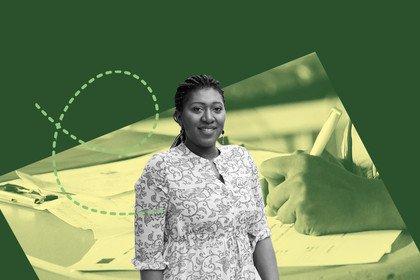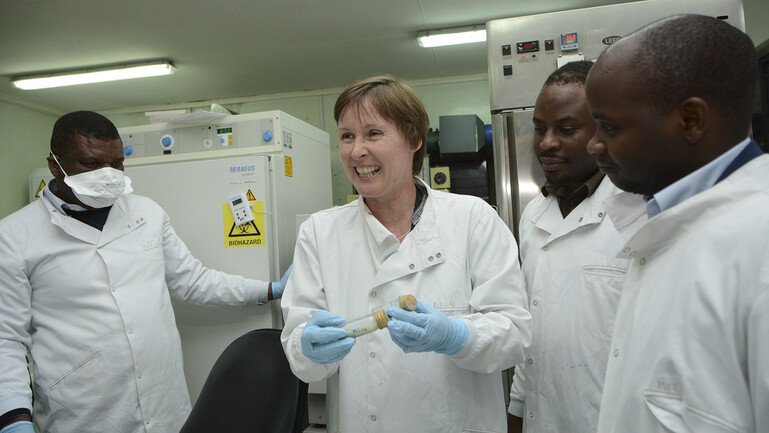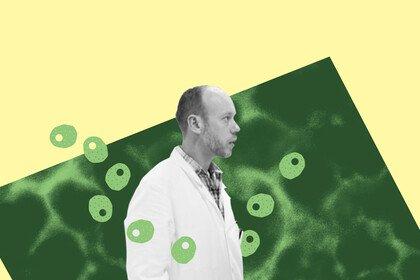
Liz's story: how she transformed HIV testing in Africa
Liz Corbett is a Wellcome Senior Research Fellow, professor of tropical epidemiology at the London School of Hygiene and Tropical Medicine and the head of the HIV/TB research group at the Malawi-Liverpool-Wellcome Trust Clinical Research Programme. Her work in Africa has focused on TB and HIV diagnostic interventions in the community and at primary care level.
Liz paved the way for HIV-self testing research and implementation and is now leading multi-million pound projects across several African countries. To get to this point she had to navigate plenty of obstacles – from getting support for early-stage research ideas to influencing policy at national and international level.
In the 1990s and 2000s, medical services in low- and middle-income countries were overwhelmed with people dying of HIV and tuberculosis (TB). The local infrastructure wasn’t sufficient to save people’s lives. And outside hospital settings there was little access to diagnosis and care.
Liz’s PhD had been on TB diagnosis in HIV-prevalent populations in South Africa, and she’d spotted a missing piece of the puzzle. "It’s not even my training in particular but it was just a very obvious gap, how difficult it was for people to access diagnosis."
So she decided to focus her research on looking at this issue.
The first TB lab in Zimbabwe
Liz moved to Harare, the capital of Zimbabwe, in 2001 as a clinical research fellow with the London School of Hygiene and Tropical Medicine. With Wellcome funding, she started to set up a TB lab that is still the only functional culture lab in the country.
"Wellcome allowed me to do early-stage research that not many other funders would take a risk on," she says. But it brought plenty of challenges. "If you’re an ‘early adopter’, then you’re the one who encounters all the problems while getting systems sorted out, plus unanticipated issues."
It took a couple of years to build a good TB culture lab from scratch.
"Nowadays there’s been some investment in the kind of equipment you need for TB labs in resource-poor settings, but when I went there that initiative hadn’t started. We were probably one of only very few functional TB labs between South Africa and Kenya.
"It was tough. We didn’t have any core funding to pull on, so you’re worrying about every light bulb. I think working with no core funding is definitely a labour of love, for everyone involved."
I think working with no core funding is definitely a labour of love, for everyone involved.
But Liz managed to build a strong team – she had moved to Zimbabwe because she knew the country had good public health infrastructure and great education, including in medical microbiology. "We got some fabulous junior researchers coming through," she says. "And a lab manager who was really good. As soon as we got her, it was plain sailing. The work we did was one of a kind, nobody was looking at disease burdens outside the hospital setting at that time."
In 2005 Liz got her first senior research fellowship from Wellcome to evaluate an approach to TB screening that had been implemented in the USA and Europe in the 1950s-70s, but without providing clear evidence of its benefits. Liz’s study – which involved screening over 100,000 people in Zimbabwe – showed promising results and led to immediate policy review by the World Health Organization (WHO).
"It was a really good time to be doing that kind of work, and we were uniquely placed – there was no one else in that space. I was very happy to have Wellcome carry on my funding."

One of the ground-breaking research projects she led was in collaboration with the WHO HIV Department in Geneva. The aim was to investigate health workers’ access to HIV care, testing and prevention in several countries in Africa.
Then came an important conceptual breakthrough. Liz and her team discovered that HIV self-testing, which was not very accessible at the time, was incredibly important for health workers who were finding it problematic to get tested any other way.
"You need a moment of privacy to learn your HIV result. For that moment you don’t want anyone to be anywhere near you. Once you know the result, then it actually becomes easier to link in and get support to get treatment," she discovered. "We came out with a WHO recommendation that countries should support self-testing in their health workforces, if nowhere else, and it really grew from there."
Building on that project became Liz’s main focus over the next years, and that meant moving to Malawi.
Liz's career milestones
- 1996-1999
Wellcome Training Fellowship in Clinical Tropical Medicine
London School of Hygiene and Tropical Medicine
- 2000
PhD in Clinical Epidemiology
University of London
- 2000-2005
Wellcome Career Development Fellowship in Clinical Tropical Medicine
London School of Hygiene and Tropical Medicine
- 2005-2010
Wellcome Senior Research Fellowship in Clinical Science
London School of Hygiene and Tropical Medicine
- 2007
Wellcome Clinical Excellence Award for Overseas-Based Clinicians
- 2009-2015
Member on the Strategic and Technical Advisory Group for Tuberculosis
World Health Organization
- 2009-present
Honorary Professor
College of Medicine, Malawi
- 2012-present
Professor in Tropical Epidemiology
London School of Hygiene and Tropical Medicine
- 2010-2016
Wellcome Senior Research Fellowship in Clinical Science (Renewals)
London School of Hygiene and Tropical Medicine
A first-of-a-kind trial
In 2009, Liz joined the Malawi-Liverpool-Wellcome Trust Clinical Research Programme (MLW) in Blantyre. Working for a major programme was a huge change.
"If you’re based fully in an African institute, without any other support but the grants you’re bringing in, then you get to know Africans and the African environment in a way that you don’t within the constraints of a major programme. If you then move on to a more comfortable situation, you’re able to really capitalise on those resources and know how to build people," she says.
She started to lead the HIV/TB group at MLW – today a team of over 120 people including over a dozen academics – and helped build up a sister research group in Malawi’s College of Medicine.
In 2012-2014 she led the first large-scale evaluation of HIV self-testing in the world, with funding from Wellcome.
"No other funders would fund it at that time because they were worried about suicides. They were in a catch 22 where no one would fund a large enough study to show that it wasn’t a concern, and until somebody showed it wasn’t a concern there was a complete embargo, even on research," she explains.
Click images to open gallery
The study was a success – it showed very good uptake of HIV self-testing and increased demand for treatment. Liz started thinking about how to take it further, but the only projects she had in mind were large-scale projects and most funders wouldn’t award grants in the tens of millions of pounds.
She tried a different approach. "We went to Unitaid [a global health initiative] and lobbied to have self-testing included in their mandate," she says.
Liz and her collaborators made a compelling argument and got initial funding for two years, and subsequent funding for another three – in total $72 million, a quarter of which went to the research Liz has been coordinating across six African countries. She argued that, to show impact, community-level evaluations had to sit alongside implementation. "That way we would avoid falling into the same trap of incompletely documented benefits as TB interventions had in the past," she says.
My biggest breakthroughs have come from stuff that seemed to be very counter to conventional wisdom.
Even with funding and support from international organisations – like Population Services International, which leads the UNITAID project and provides the testing services, and the WHO – the process hasn’t been easy.
"When we started there were just masses of barriers," Liz says. "The major ones were policy barriers, regulatory barriers, and general lack of awareness about self-testing. And there was a good product being retailed in the USA, but it hadn’t been optimised for Africa."
Bringing the HIV-self testing kit on to the African market meant starting conversations from scratch with countries where there were no policies or regulations on HIV self-testing. "Basically, each government had to rewrite its HIV policy, the WHO had to redo its HIV policy, so it was a big undertaking."
But despite the challenges, the project has had global success.
"We’ve moved self-testing from something that wasn’t happening at all before we started in 2012, to something that’s been adopted already by 59 countries with 6 million tests being used this year [2018]," she adds.
Click images to open gallery
With the HIV project set for completion, Liz is now keen to focus on other research.
"My heart is in TB," she says. "I’m looking forward to getting back to TB and that work is already building up. But the TB work is more difficult because the diagnostics are very difficult and you need study populations in the hundreds of thousands to show impact at community-level."
And that’s the challenge she took on. Her work has highlighted the public health importance of reducing undiagnosed TB, which is a major cause of death in Southern Africa.
Through her research, she has explored different diagnostic strategies – from community-wide interventions to medical innovations such as X-ray-based TB diagnostics, but always with a focus on evaluating improvements in health.
What’s important for Liz is running against the herd. "My biggest breakthroughs have come from stuff that seemed to be very counter to conventional wisdom. That’s actually an area where you’re going to find very few other people and probably a genuine lump of gold."
Building an exciting research environment in Africa
As well as juggling between two different research areas, Liz has also been able to manage multiple roles. "I’ve got three institutions that I worry about all the time: MLW, the College of Medicine and the London School of Hygiene and Tropical Medicine.
"It’s tricky," Liz admits. "You’re constantly having to keep everyone happy, while at the same time not letting your own skills get out of date. So it’s striking that balance."
When it comes to family life, Liz believes that raising her two children in Africa might have made things easier than in the UK, where childcare is not that affordable. "I think as a woman, if you want kids you have to be very strategic about how you manage that. My solution was to try and make sure I was settled in an African environment before I had kids, where the expectations are that you’ll have full-time help."
But working in Africa has had its own challenges, one of which has been trying to maintain a profile in the UK. "You can feel a bit scientifically isolated," Liz says. Although this is now less of a problem than when even access to email was difficult and everyone had to rely on costly telephone and postal services.
The overall scientific environment in Africa has changed enormously since Liz first moved here. The research ecosystem has grown and there has been significant investment in local researchers. "That makes for a competitive research environment," Liz says. "This is good for international health."
That’s what science is about – having ideas, putting them to the test, getting excited about them and pulling other people into that.
For the past ten years, she has been teaching and designing research training programmes at the College of Medicine. She’s now seeing her former students taking over and doing the teaching. "You just see people transform. If you’ve got an eye for talent, you can spot that in people when they’re quite raw. They are really driven still, however many years later, bringing other people along with them.
"That’s what science is about – having ideas, putting them to the test, getting excited about them and pulling other people into that."
The first Malawian PhD students are also coming through the college, five last year. And Liz is incredibly proud of them. "You need the enthusiasm, you need the candidates and you need the environment where you can actually manage that number of people. I’m very happy about that. Now we’re getting really good African scientists coming through and very much leading [research]."
Liz’s achievements are a testament to her dedication and passion. Liz did not stop at a positive trial result showing that HIV self-testing was effective, but instead sought more funding to ensure that people had access to the intervention. It's heartening to see how Wellcome support for our Africa and Asia programmes can enable researchers to follow the science to health impact.

